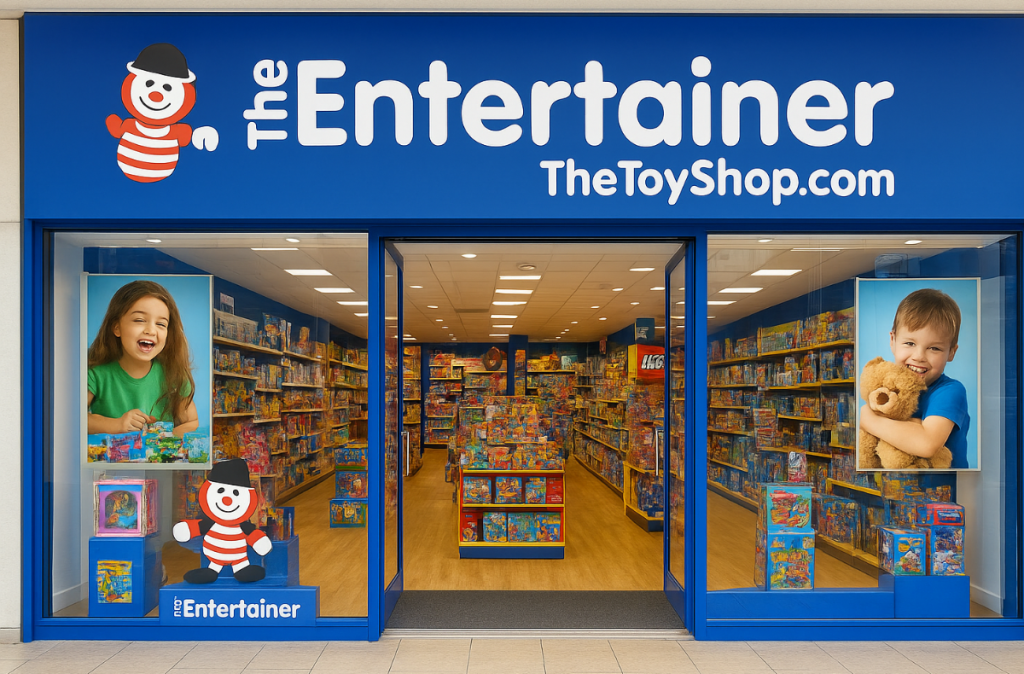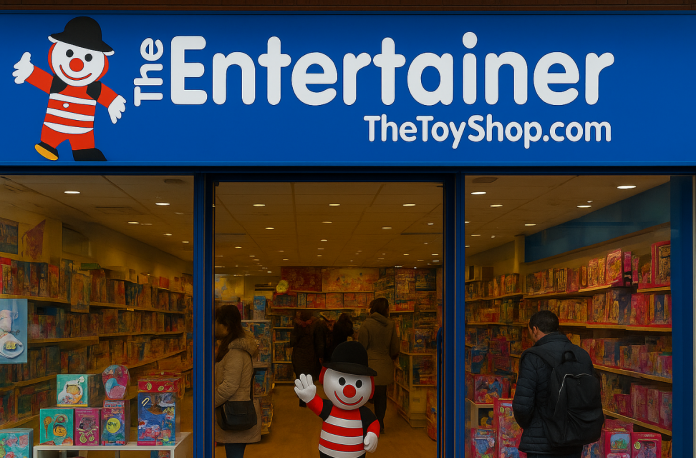The toy firm’s employee ownership model, proposed by the director and family, is a big moment in the history of British high-street retailers. The Entertainer toy shop employee ownership plan, led by Gary Grant, is a groundbreaking approach. With his wife Carla and their two children, Gary Grant, founder of “The Entertainer”, will transfer 100% ownership to the company’s 1,900 employees through an Employee Ownership Trust (EOT). As this new era dawns for one of Britain’s most iconic toy retailers, it signals the direction the store has to face while preserving the culture that made it famous.
Starting in 1981 with just one shop in Amersham, founded by Gary and Catherine Grant, The 4 for Kids in Abingdon & Woodstock has developed today into a multichannel international business with over 160 stores and more than 1,000 wholesalers. The transition to employee ownership in September 2025 marks the conclusion of a carefully designed succession plan. This plan aims at safeguarding both the company’s family character and its long-term independence.
Along with successful, employee-owned retailers like John Lewis Partnership and Richer Sounds, The Entertainer has now become another example of how the toy shop’s employee ownership model can develop business models. These models benefit workers, customers, and the communities in which they operate.
Understanding Employee Ownership Trusts
An Employee Ownership Trust is a legal arrangement in which company shares are placed in trust for the benefit of all employees. This provides an employee collective ownership of the company. Employees have an interest in the company’s profits and strategic direction.
These are some factors that make The Entertainment toys’ employee ownership structure favorable to employees. Such employees earn tax-free profit-sharing bonuses based on their employer’s performance. This fact provides a direct financial incentive for employees to work for their employer. The employees also have a voice through the new Colleague Advisory Board that will be part of the three-member Trust Board.
This is a significantly different model from traditional employee share schemes. While individual share ownership can create inequality among staff, structures like the EOT ensure that all employees benefit equally. They ensure that the wealth generated by a company’s operations is distributed more fairly among its workers. Employee ownership in the entertainment industry is an example of how businesses can distribute wealth more fairly. Yet, they remain operationally efficient.
In the UK, the Employee Ownership Trust has gained popularity, with over 1,000 businesses now operating under this structure. Organizations like Aardman Animations and Scott Bader Commonwealth have successfully utilized EOTs. This helps them maintain their independence and values while empowering their employees.
The Grant Family’s Strategic Transition
The process behind setting up the Entertainer toy shop employee ownership was Gary Grant’s decision, following decades of planning. After 44 years of building the business with his wife, Catherine, and later with their sons, the Grant family concluded that employee ownership would provide the best guarantee that The Entertainer’s special culture would be preserved.
A timeline has carefully enforced the transitioning process. The complete ownership transfer is expected to finalize in September 2025. In addition, satisfactory profit-sharing bonuses above the minimum threshold are anticipated to commence in the financial year 2027. The gradual approach enables the business to cope with changes while maintaining operational stability.
Andrew Murphy OBE, who joined as Group CEO in 2023, will continue to lead The Entertainer under this new ownership model. His leadership team has been integral in defining the “Play to Win” strategy. They also crafted the ToyBox B2B2C offering, which positions the company for future growth opportunities.
The cost implications, balancing the scales of equity and wealth ownership, would not be the only part of the Entertainer toy shop employee ownership that the Grant family would take on. It was a decision, Gary Grant emphasized, “to believe that business is a force for good” and to demonstrate loyalty to their staff who have brought it all.
Employee Benefits Under the Entertainer Toy Shop Employee Ownership Model
This employee ownership framework at The Entertainer toy shop creates exceptional possibilities for the company’s staff. All 1,900 workers will be beneficiaries of the trust. They will be entitled to share additional profits made by the company in the form of tax-free bonuses, linked directly to the business’s performance.
Employee representation will be established through the Colleague Advisory Board. This board will inform the company policy development and employee sentiment to the senior management. It will have direct input into strategic decisions through its representative on the Trust Board.
Job security has received a remarkable upward boost through employee ownership. There are approximately 400 employees who have spent over ten years with The Entertainer. Additionally, some have been there for more than twenty years. This new structure rewards such dedication. Thus, incentives are provided for new hires to stay with the company.
Entails broadening career development opportunities with employees directly owning part of the business’s success. This design of the employer’s toy shop encourages improvement and initiative, as employees derive a profit from the suggested improvements.
One should not undermine the psychological dimension or ownership. Employee-owned organizations, research has shown, usually achieve production levels higher than their competitive counterparts.

Customer Experience and Service Quality
Improvement for customers, not disturbance, is what the employee ownership transition of the Entertainer Toy Shop is all about. That is indeed superior customer service; staff know that it contributes to their success when they satisfy customers personally.
The Entertainer is going to be with that kind of outlook of providing “payable happiness, and unforgettable moments.” Now that employees have an ownership stake in the company, the desire to provide better service will increase even more.
Store operations continue without any planned closures, despite some retailers being blamed for the severe economic impact. The rationale for this is that the business is statistically debt-free. Furthermore, it is recording good pre-tax profits of £6.7 million.
It is the same kind of continuity in customer loyalty. Employee ownership of the entertainer toy shop has ensured that a family-friendly culture remains intact. Unlike mergers and acquisitions of larger businesses, this approach prevents a culture shift.
The Entertainer’s growth strategy is continued under employee ownership, which includes partnerships with Tesco and Matalan. The ToyBox B2B2C offering and international growth plans remain priorities for the newly empowered workforce.
Industry Impact and Future Outlook
The decision to officially place The Entertainer toy shop in employee ownership reflects broader trends in UK retail. As high street retailers face pressure from rising online presence and economic uncertainties, employee ownership presents an enduring alternative to buyouts by private equity or corporate consolidation.
According to James de la Vingne, the Chief Executive of the Employee Ownership Association, the move made by The Entertainer may be viewed as part of a growing trend in the retail sector. “Employee ownership helps futureproof beloved brands, root jobs in local communities, and inject wealth into regional economies.”
The toy retail sector is rife with its challenges, from seasonal fluctuations to the whims of changing consumer preferences. Following the employee ownership arrangement model for Entertainer, the company is better positioned to respond to and adapt to such challenges, as those most affected by decisions are also part of making them.
The employee ownership system also comes with competitive advantages. Whereas competitors might well be unable to resist the pressure to return short-term profits to shareholders, The Entertainer is free to prioritize making a positive impact while doing the right thing for the community, sustainability, and other contemporary values of consumers.
The arrangement of employee ownership in The Entertainer is currently an example of success.
Long-term Vision and Sustainability
It aligns with the Entertainer’s vision to empower employees to own their toy shop company, maintaining fair market independence. This model enables the company to transform itself on demand without compromising its original values and culture.
Employee ownership completely redefined sustainability for the business. Instead of maximizing returns for outside shareholders, this balance applies to profitability alongside employee welfare, customer satisfaction, and community impact.
New drive for innovation as employees directly own the outcomes of business activities. Employee ownership in the entertainment toy shop encourages creative problem-solving and process improvement, as benefits are directly tied to those who implement change.
The international expansion strategy under the new employee ownership concept is still extensible. Employee ownership generally motivates workers, increasing the chances of successful expansion because motivated employees deliver more results than those in conventional employment structures.
Transforming Retail Through Shared Ownership
The transition of the Entertainer into an employee ownership model is more than just an example of a business succession plan. It shows how businesses can establish sustainable retailer models that benefit all stakeholders. By making its employees owners, it positions itself for continued success, along with the values necessary to maintain customer and community loyalty.
By adopting an employee ownership approach for the entertainer toy shop, the business model can serve as a prototype for alternative strategies that family businesses may consider when looking to exit without the traditional route. While continuing to exert economic pressure on retailers, employee ownership brings considerable stability, motivation, and a long-term perspective that profit maximization alone would hardly match.
Similar transitions into employee ownership are available to toy retail professionals and business owners. The Entertainer draws attention to the lessons of this journey toward its destiny in employee ownership. Careful planning, a slow transition, and a commitment to company culture offer valuable lessons applicable to all sectors.
This could be the future of retail, where those who make it happen every day share in the success, as shown by the Entertainer Toy Shop’s employee ownership model. As The Entertainer embarks on this new chapter, it pioneers a path that other retailers may follow in pursuing sustainable, community-focused business models.











